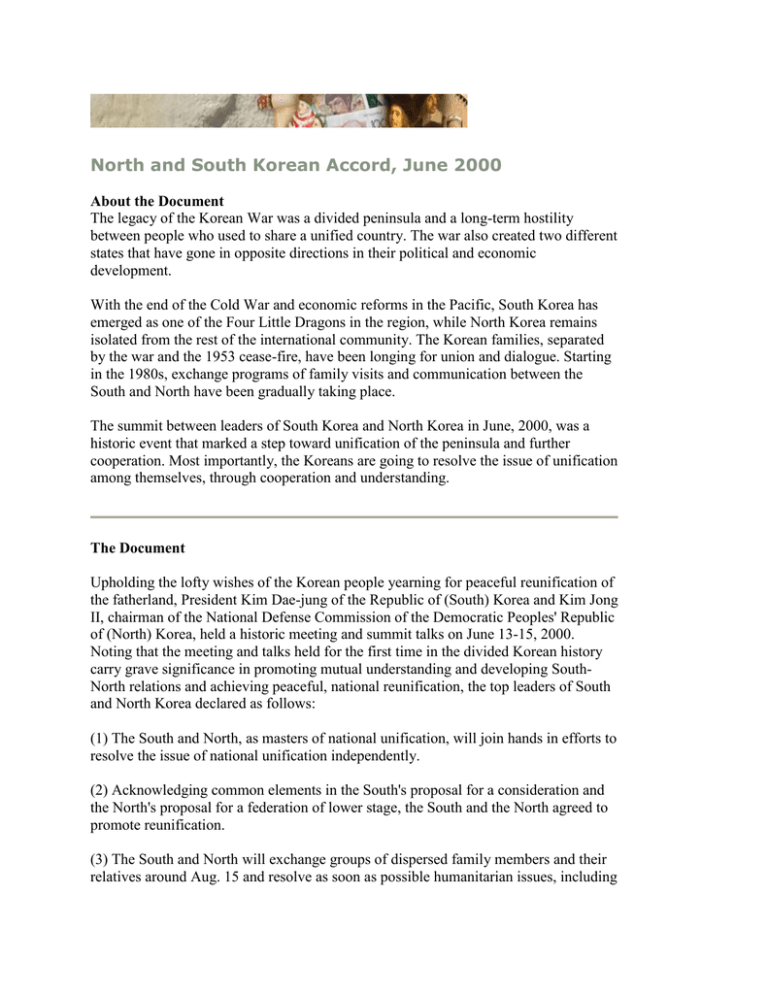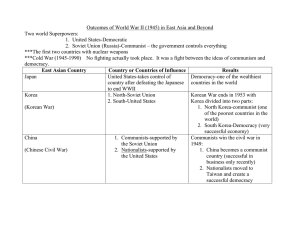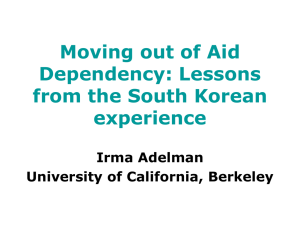North and South Korean Accord, June 2000
advertisement

North and South Korean Accord, June 2000 About the Document The legacy of the Korean War was a divided peninsula and a long-term hostility between people who used to share a unified country. The war also created two different states that have gone in opposite directions in their political and economic development. With the end of the Cold War and economic reforms in the Pacific, South Korea has emerged as one of the Four Little Dragons in the region, while North Korea remains isolated from the rest of the international community. The Korean families, separated by the war and the 1953 cease-fire, have been longing for union and dialogue. Starting in the 1980s, exchange programs of family visits and communication between the South and North have been gradually taking place. The summit between leaders of South Korea and North Korea in June, 2000, was a historic event that marked a step toward unification of the peninsula and further cooperation. Most importantly, the Koreans are going to resolve the issue of unification among themselves, through cooperation and understanding. The Document Upholding the lofty wishes of the Korean people yearning for peaceful reunification of the fatherland, President Kim Dae-jung of the Republic of (South) Korea and Kim Jong II, chairman of the National Defense Commission of the Democratic Peoples' Republic of (North) Korea, held a historic meeting and summit talks on June 13-15, 2000. Noting that the meeting and talks held for the first time in the divided Korean history carry grave significance in promoting mutual understanding and developing SouthNorth relations and achieving peaceful, national reunification, the top leaders of South and North Korea declared as follows: (1) The South and North, as masters of national unification, will join hands in efforts to resolve the issue of national unification independently. (2) Acknowledging common elements in the South's proposal for a consideration and the North's proposal for a federation of lower stage, the South and the North agreed to promote reunification. (3) The South and North will exchange groups of dispersed family members and their relatives around Aug. 15 and resolve as soon as possible humanitarian issues, including the repatriation of communist prisoners. (4) The South and North will pursue a balanced development of their national economies and build mutual trust by accelerating exchange in the social, cultural, sports, health and environmental sectors. (5) In order to put these agreements into practice, the South and North will hold a dialogue between government authorities at an early date. President Kim Dae-jung cordially invited National Defense Commission chairman Kim Jong II to visit Seoul and he agreed to do that at an appropriate time. Source: "North and South Korean Declaration Text: June 2000". Reprinted by permission of the Embassy of Korea in Washington D.C. Glossary repatriation to send a person (e.g., a prisoner of war) back to his or her own country Analysis Questions 1. Given the fact that both the United States (under the United Nations banner) and China were involved in the Korean War, why are these two powers not included in this accord? 2. How important is this accord to the future cooperation of both South and North Korea? 3. What are the major differences between North Korea and South Korea? 4. What is the main goal for both the South and North Korean people in the summit?



